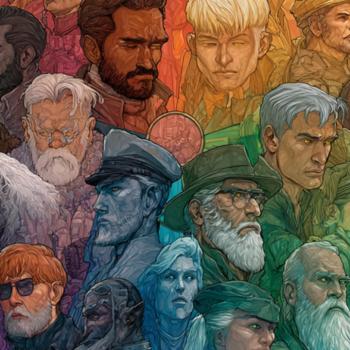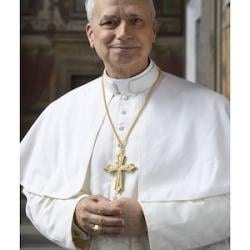
The early Christian fathers emphatically believed that the Old Testament (or Hebrew Bible) was one lengthy prediction of the birth, life, and death of Jesus Christ. Indeed, they read nearly all scripture though Christocentric lenses. Of course, some biblical scholars question the propriety of such a reading of the Bible. Nevertheless, Christians for nearly two thousand years have been reading the Old Testament as a foreshadowing and witness of Jesus as the Son of God and the Savior of the world. Consequently, numerous passages in the Hebrew Bible seem to foretell Jesus’ life—including His death upon the cross. For example, in Genesis 3:15, God tells the serpent (in Eden), “And I will put enmity (or open hostility) between you and the woman, and between your seed and her Seed (or offspring); He shall fatally bruise your head, but you shall only bruise His heel.” (Amplified Bible) While this verse is not specifically about the birth of Jesus, it is about His mission—which presupposes His birth. There are numerous passages (in the Old Testament) which predict Jesus’ ransom sacrifice (e.g., Psalm 22:1, 7-8 & 16-18; Isaiah 53:5, 7 & 9; etc.) None of these directly address His birth but, by predicting His work of atonement, they ultimately testify of His birth and life.
That being said, there are a handful of verses in the Hebrew Bible that are traditionally understood by Christians to be prophesying Jesus’ birth. Most of these will sound familiar, as they are some of the most oft-quoted passages of the Old Testament—either by New Testament writers or by believers in the New Testament message. Each passage foretells some aspect of the nativity story; elements we often contemplate as Christians at Christmas time.
Some 700 years before Jesus was born, the Prophet Isaiah declared: “Therefore the Lord himself will give you a sign: A virgin will conceive and give birth to a son and will call him Immanuel.” (Isaiah 7:14) The Hebrew can also be rendered: “Therefore, the Lord Himself shall give you an omen (or miraculous sign); Lo, a young woman of marriageable age shall become pregnant and bear a son and will call his name ‘God with us’.” Some scholars have claimed that Isaiah was simply predicting the birth of his own son through his non-virgin wife. They point to the fact that the Hebrew does not have to be translated “a virgin shall conceive,” but can be rendered “a young maiden” or “girl of marriageable age” will conceive—therefore allowing for some quite normal, non-miraculous birth. While that “less miraculous” reading is possible, the Hebrew still insists that the birth would be a “miraculous sign” or omen, and the child would be “God with us.” Both of these textual insights make it hard to believe that this was really simply a prediction about Isiah’s wife having a child. While it is true that a non-miraculous reading is possible, it seems to look past some of the miraculous language of the passage. Additionally, Isaiah himself stated: “Lo, I, and the children whom Jehovah hath given to me, are for signs and for wonders in Israel, from Jehovah of Hosts, who is dwelling in Mount Zion.”(Isaiah 8:18) In other words, the prophet did name his three sons seemingly crazy names, like “God is with us,” “a remnant shall return,” and “the spoil speeds, the prey hastens.” However, he said he did so because he and his three sons were symbols or signs which foreshadowed what was to come—namely the scattering of Israel and the coming of a Messiah who would redeem the fallen and lost covenant people. It is for this very reason that the New Testament quotes Isaiah 7:14, stating: “The virgin will conceive and give birth to a son, and they will call him Immanuel (which means ‘God with us’).” (Matthew 1:23) Thus, clearly the author of the gospel of Matthew believed that Isaiah was predicting Jesus’ birth, and not primarily the birth of the prophet’s own son.
Similar to the passage in Isaiah 7:14, Isaiah 9:6 declares: “For to us a child is born, to us a son is given; and the government shall be upon his shoulder, and his name shall be called Wonderful Counselor, Mighty God, Everlasting Father, Prince of Peace.” Most will recognize this line, as it is one of the most memorable from Handle’s Messiah. This verse is traditionally seen as a messianic prophesy—meaning a prediction which foresaw and foretold the coming of the Savior, Israel’s messiah. In the verses leading up to this, Isaiah described a then future time when the Messiah would come and bring light back to Israel’s darkened land (see vv:2-3). This messianic redeemer would break the hold Israel’s evil oppressors had over them and end the wars they had been subject to (see vv:4-5). As part of these promises of the prophet, Isaiah declared that a child would be born, foreshadowing Christ’s nativity. He predicted that the “government” would be “upon His shoulders,” suggesting that the child Jesus would grow to carry a mantle of authority—God-given authority. The prophecy goes on to speak of other attributes Christ would manifest, including being gifted at counseling others, being nothing less than the Mighty God and Father of our salvation, and functioning as the Prince of Peace in the lives of all who believe.
The book of Numbers offers an interesting prediction, the application of which will likely be obvious. It reads: “I see it, but not now; I behold it, but not near; A star hath proceeded from Jacob, And a scepter hath risen from Israel, And hath smitten corners of Moab, And hath destroyed all sons of Sheth.” (Numbers 24:17, YLT) The verse appears to be a vision of something in the future: a “star” proceeding from or associated with a descendant of the patriarch Jacob (or Israel). That descendant of the loins of Abraham, Isaac, and Jacob would hold the “scepter,” meaning He would be called of God to be a king and ruler of God’s people. And, in that capacity, he would smite the Moabites (who were symbols of idolatry and immorality) and the sons of Sheth (or “tumult” and “chaos,” as some render the Hebrew). In other words, Numbers 24 is prophesying of a future king connected with Israel and His associated “star.” This king would destroy evil, in the form of idolatry, immorality, and chaos. It may very well be that the following verses from the gospel of Matthew are speaking of the fulfilment of Numbers 24:17: “Now after Jesus was born in Bethlehem of Judea in the days of Herod the king, behold, magi from the east arrived in Jerusalem, saying, “Where is He who has been born King of the Jews? For we saw His star in the east and have come to worship Him” (Matthew 2:1-2).
Somewhere around the 5th century BC, a messianic prophesy (attributed to the prophet Micah) was penned: “Bethlehem Ephrath, you are one of the smallest towns in the nation of Judah. But the Lord will choose one of your people to rule the nation—someone whose family goes back to ancient times.” (Micah 5:2 CEV) Then, in the first century AD, the Gospel of Matthew was penned, declaring the fulfillment of Micah’s words: “After Jesus was born in Bethlehem in Judea, during the time of King Herod, Magi from the east came to Jerusalem, Saying, ‘Where is he that is born King of the Jews?’” (Matthew 2:1-2) For centuries, Christians have seen this Old Testament verse as a prediction of the birth of Jesus, He who was “born King of the Jews.”
Related to this last prediction is this next one: “May the kings of Tarshish and of distant shores bring tribute to him. May the kings of Sheba and Seba present him gifts. May all kings bow down to him, and all nations serve him.” (Psalm 72:10-11) The magi or “wise men” who visited Jesus brought him gifts and bowed down before Him to worship Him. They are understood by many to be the fulfillment of this messianic psalm: “On coming to the house, the magi saw the child with his mother Mary, and they bowed down and worshiped him. Then they opened their treasures and presented him with gifts of gold, frankincense, and myrrh.” (Matthew 2:11)
Perhaps two or three years prior to the appearance of the “wise men,” shepherds saw an angel who told them of Jesus’ birth, and they sought Him diligently, that they too might worship Him. In the 72nd Psalm we read: “Those that dwell in the wilderness shall bow before him” (Psalm 72:9, JUB). In seeming fulfillment of this, the Gospel of Luke tells us: “And there were in the same country shepherds abiding in the field, keeping watch over their flock by night. And, lo, the angel of the Lord came upon them, and…said unto them, Fear not: for…unto you is born this day in the city of David a Savior, which is Christ the Lord. And this shall be a sign unto you; Ye shall find the babe wrapped in swaddling clothes, lying in a manger… And it came to pass, as the angels were gone away from them into heaven, the shepherds said one to another, Let us now go even unto Bethlehem, and see this thing which is come to pass, which the Lord hath made known unto us. And they came with haste, and found Mary, and Joseph, and the babe lying in a manger. And when they had seen it, they made known abroad the saying which was told them concerning this child.” (Luke 2:8-11 & 15-17) Truly, those who “dwelt in the wilderness” “bowed before” the Christ child and worshiped Him, and one of the central messages of the nativity story is that we too must do the same.
Finally, we turn to Hosea 11:1, a messianic prophecy less about the birth of Jesus, and more about the dangers of His childhood. The prophet writes: “Out of Egypt I called my son.” Some date this verse to as early as the 8th century BC, though apparently looking forward to an event in the first century, when Jesus was but a boy. It will be remembered that Joseph and Mary had to flee to Egypt with the very young Jesus in order to protect Him from Herod’s famous “slaughter of the innocents.” The Gospel of Matthew quotes this verse, applying it to Jesus’ exodus from Bethlehem and then return from Egypt. Matthew records: “When Joseph arose, he took the young child and his mother by night, and departed into Egypt: And was there until the death of Herod: that it might be fulfilled which was spoken of the Lord by the prophet, saying, ‘Out of Egypt have I called my son’.” (Matthew 2:14-15)
Certainly, other passages could be seen as foretelling the birth of Christ—though those just quoted are among the most commonly mentioned. Regardless of how some historians, academics, and even atheists read the text, a Christian would be hard pressed to read the Old Testament as void of messianic prophecies. If Jesus was who He professed to be, then surely the prophets of old must have foretold His birth, life, ministry, and eventual death. Jesus Himself declared to His doubting antagonists: “Search the Scriptures, for…it is they which testify of Me.” (John 5:39)
12/18/2023 10:44:27 PM











